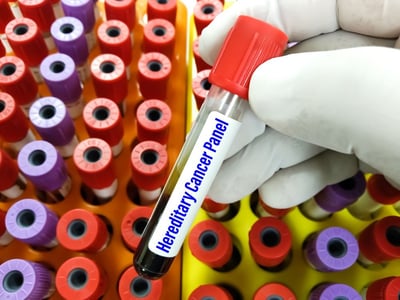Breast Cancer



Relevance: Medium
Most relevant for: People at increased risk for breast cancer undergoing prophylactic bilateral mastectomy due to an inherited mutation in BRCA1, BRCA2 or PALB2. People with TNBC who still have breast cancer after chemotherapy.
Update: A breast cancer vaccine for people with an inherited BRCA1, BRCA2 or PALB2 mutation
A breast cancer vaccine is showing promise in early clinical trials. Initially, the vaccine was tested in people with triple-negative breast cancer (TNBC) who were at high risk for recurrence. Now the vaccine is being tested to lower breast cancer risk among people with an inherited mutation in BRCA1, BRCA2 or PALB2. It is also being tested in people with triple-negative breast cancer who are at high risk for recurrence and are taking the immunotherapy drug Keytruda (pembrolizumab) after completing chemotherapy. (Posted 1/31/24)
Este artículo está disponible en español.
READ MORE ›


Relevance: Medium
Most relevant for: Transgender women with inherited mutations who are considering or have had gender affirming care
Article: Breast cancer risk for transgender women with inherited mutations
There has been little research on breast cancer risk for transgender women who are at high risk for breast cancer due to an inherited mutation. This review summarizes what we know. (Posted 11/29/23)
Este artículo está disponible en español.
READ MORE ›


Relevance: Medium-High
Most relevant for: Women with breast cancer who are considering pregnancy
Study: Pausing hormone therapy to pursue pregnancy does not increase the short-term risk of early-stage cancer recurrence
Women who paused hormone therapy treatment of early-stage hormone receptor-positive (HR-positive) breast cancer to attempt to get pregnant had no increase in short-term recurrence. (Posted 11/3/23)
Este artículo está disponible en español.
READ MORE ›


Relevance: Medium-High
Most relevant for: People interested in the use of artificial intelligence in medicine
Article: Artificial intelligence (AI) may find breast cancer on mammograms sooner
Artificial intelligence (AI) tools may help doctors read mammograms. This assistance may lead to earlier diagnoses of breast cancer. (Posted 9/29/23)
Este artículo está disponible en español.
READ MORE ›


Relevance: High
Most relevant for: People interested in genetic testing.
Article: Genetic testing and the future of medicine
An article published in Katie Couric Media discusses genetic testing and how it can impact health. The author talked with Dr. Robert Steiner, a doctor who specializes in genetics. He talked about genetic testing and how the results can affect health and change lives. (Posted 9/28/23)
Este artículo está disponible en español.
READ MORE ›


Relevance: Medium-Low
Most relevant for: People with solid tumors.
Article: Promising drug for cancer treatment begins clinical trials
Researchers at City of Hope are testing a new type of cancer treatment drug. When tested in animals and cells taken from human cancers, this new drug prevented the growth of many types of cancer. Initial clinical trials in people have just started. (Posted 9/7/23)
Este artículo está disponible en español.
READ MORE ›


Relevance: Medium-High
Most relevant for: People with breast cancer or metastatic breast cancer in sexual or intimate relationships and their partners
Topic: Sex and intimacy after breast cancer
A breast cancer diagnosis and treatment can affect relationships with romantic partners. This review highlights two studies that looked at how people with breast cancer and their partners are affected, how they cope, how best to communicate with each other and how to talk with healthcare providers about concerns related to cancer and sexuality. (Posted 8/8/23)
Este artículo está disponible en español.
READ MORE ›


Relevance: Medium-High
Most relevant for: People who are using or have recently used birth control containing only the hormone progestin
Study: Progestin birth control may slightly increase breast cancer risk
Different types of birth control carry different cancer risks. Birth control using the hormone progestin slightly increases the risk of breast cancer during use and for a few years after use. (Posted 7/10/23)
Este artículo está disponible en español.
READ MORE ›


Relevance: Medium-High
Most relevant for: People belonging to the LGBTQ+ community
Study: Breast cancer disparities among the LGBTQ+ community
This study looked at differences in breast cancer treatment outcomes among people from the LGBTQ+ community. (Posted 6/28/23)
Este artículo está disponible en español.
READ MORE ›


Relevance: Medium-High
Most relevant for: People who have mammograms
Guideline: What is breast density and why does it matter?
New FDA guidelines for mammograms will go into effect by September 2024. Current FDA guidance requires hospitals and breast centers to give people information about their breast density with their mammogram results. By September 2024, mammogram providers will need to relay to patients who have dense breast that they should discuss the need for additional imaging. This article provides an overview of what breast density means and why it matters. (Posted 6/8/23)
Este artículo está disponible en español.
READ MORE ›